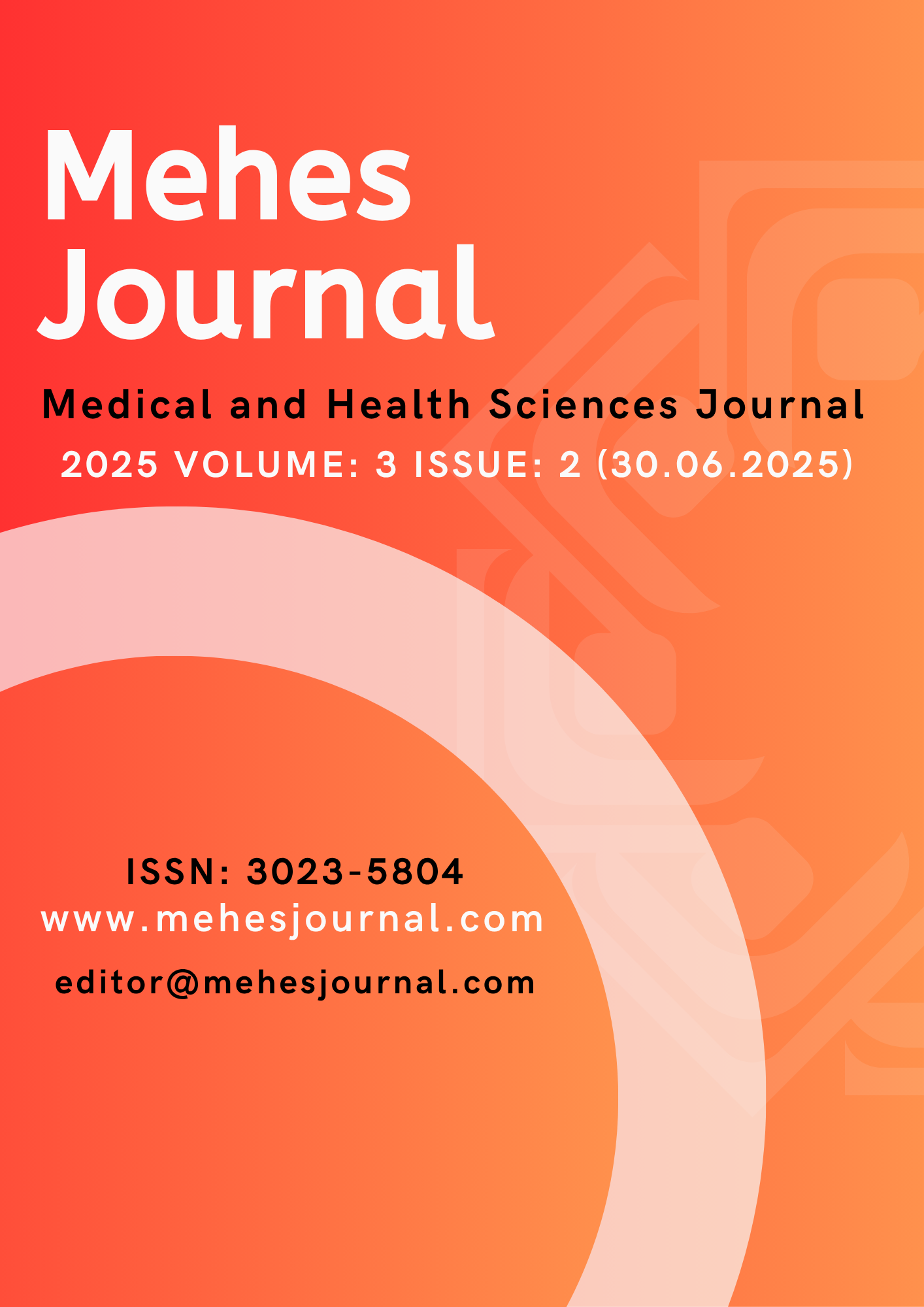Evaluation of the Weaning Process in Patients Undergoing VA-ECMO Using Artificial Intelligence Based Approaches
DOI:
https://doi.org/10.5281/zenodo.15775992Keywords:
Veno-arterial ECMO, Cardiogenic shock, Artificial intelligence, Mortality risk prediction, WeaningAbstract
Veno-arterial extracorporeal membrane oxygenation (VA-ECMO) is widely used as a temporary life support strategy to maintain organ perfusion in patients experiencing severe cardiac dysfunction. However, the discontinuation of this support known as the weaning process plays a critical role in patient outcomes, with its timing and success prediction representing a complex challenge in clinical decision-making. The limited predictive power of conventional methods has led clinicians to seek more advanced analytical techniques. At this point, artificial intelligence (AI) algorithms offer a novel perspective due to their ability to analyze multivariate clinical data, their learning capabilities, and high predictive performance. In particular, machine learning-based models have shown promise in enabling the development of early warning systems with high accuracy in patient monitoring. Recent studies suggest that AI facilitates data driven and objective insights into the weaning process in VA-ECMO patients.
The aim of this review is to examine current AI-based approaches developed to predict weaning success in patients receiving VA-ECMO support, to evaluate their applicability in clinical decision support systems, and to provide a comprehensive overview of the literature in this field.
References
Abrams D, Garan AR, Abdelbary A, Bacchetta M, Bartlett RH, Beck J, et al. Position paper for the organization of ECMO programs for cardiac failure in adults. Intensive Care Med. 2018;44(6):717-29.
Le Gall A, Follin A, Cholley B, Mantz J, Aissaoui N, Pirracchio R, et al. Veno-arterial-ECMO in the intensive care unit: From technical aspects to clinical practice. Anaesth Crit Care Pain Med. 2018;37(3):259-268.
Schmidt M, Bailey M, Sheldrake J, Hodgson C, Aubron C, Rycus P, et al. Predicting survival after ECMO for refractory cardiogenic shock: The survival after veno-arterial-ECMO (SAVE) score. Eur Heart J. 2015;36(38):2246-56.
Karagiannidis C, Brodie D, Strassmann S, Weber-Carstens S, Philipp A, Bein T, et al. Extracorporeal membrane oxygenation: evolving epidemiology and mortality. Intensive Care Med. 2016;42(5):889-96.
Poelzl G, Eberl C, Mueller S, Winkler S, Altenberger J, Strunk G, et al. Liver dysfunction in chronic heart failure: Prevalence, characteristics and prognostic significance. Eur J Clin Invest. 2012;42(2):153-63.
George B, Parazino M, Omar HR, Davis G, Guglin M, Gurley J, et al. A retrospective comparison of survivors and non-survivors of massive pulmonary embolism receiving veno-arterial extracorporeal membrane oxygenation support. Resuscitation. 2018; 122:1-5.
Xie A, Phan K, Tsai MY, Yan TD, Forrest P. Veno-arterial extracorporeal membrane oxygenation for cardiogenic shock: An introduction for the busy clinician. Circulation. 2019; 140:2019-37.
Bakhtiary F, Keller H, Dogan S, Dzemali O, Oezaslan F, Meininger D, et al. Venoarterial extracorporeal membrane oxygenation in cardiogenic shock. JACC Heart Fail. 2018; 6:503–516.
Leick J, Liebetrau C, Szardien S, Nef H, Möllmann H, Rauch B, et al. Door-to-implantation time of extracorporeal life support systems predicts mortality in patients with out-of-hospital cardiac arrest. Clin Res Cardiol. 2013;102(9):661–9.
Pappalardo F, Pieri M, Arnaez Corada B, Aranda J, Schulte C, Wengenmayer T, et al. Timing and strategy for weaning from venoarterial ECMO are complex issues. J Cardiothorac Vasc Anesth. 2015;29(4):906-11.
Luyt CE, Landivier A, Leprince P, Trouillet JL, Combes A. Usefulness of cardiac biomarkers to predict cardiac recovery in patients on extracorporeal membrane oxygenation support for refractory cardiogenic shock. J Crit Care. 2012; 27:524. e7-14.
Aissaoui N, Luyt CE, Leprince P, Hekimian G. Predictors of successful extracorporeal membrane oxygenation (ECMO) weaning after assistance for refractory cardiogenic shock. Intensive Care Med. 2011; 37:1738-45.
Donker DW, Meuwese CL, Braithwaite SA. Echocardiography in extracorporeal life support: A key player in procedural guidance, tailoring and monitoring. Perfusion. 2018; 33:31-41.4
Dangers L, Bréchot N, Schmidt M, Meyer A, Lebreton G, Lebreton F. Extracorporeal Membrane Oxygenation for Acute Decompensated Heart Failure. Crit Care Med. 2017; 45:1359-66.
Rudym D, Pham T, Rackley CR, Grasselli G, Anderson M, Baldwin MR et al. Mortality in patients with obesity and acute respiratory distress syndrome receiving extracorporeal membrane oxygenation: The Multicenter ECMObesity Study. Am J Respir Crit Care Med. 2023;208(6):685-694.
Luo JC, Zhang YJ, Hou JY, Luo MH, Liu K, Tu GW, et al. Weaning from venous-arterial extracorporeal membrane oxygenation: the hemodynamic and clinical aspects of flow challenge test. Front Med (Lausanne). 2022; 9:989197.
Göç Ö. Use of Artificial Intelligence in Heart Diseases: Review Article. Anatolia Cor. 2024;2(2):16-22.
Mushtaq A. Artificial Intelligence in Perfusion: The Future of Data-Driven Decision-Making [Internet]. LinkedIn; 2025 [cited 2025 Jun 20]. Available from: https://www.linkedin.com/pulse/artificial-intelligence-perfusion-future-data-driven-asif-mushtaq-zvqsf
Topol EJ. High-performance medicine: the convergence of human and artificial intelligence. Nat Med. 2019;25(1):44-56.
Wang S, Tao S, Zhu Y, Gu Q, Ni P, Zhang W, et al. AI-powered model for predicting mortality risk in VA-ECMO patients: a multicenter cohort study. Sci Rep. 2025;15(1):12345.
Barbaro RP, MacLaren G, Boonstra PS, Iwashyna TJ, Slutsky AS, Fan E, et al. Extracorporeal Life Support Organization Registry International Report 2021. ASAIO J. 2021 Jul;67(7):707-713.
Zhang J, Zhao Y, Liu L, Wang X, Chen Y, Sun Q. Use of machine learning in extracorporeal life support: a systematic review. J Thorac Dis. 2023;15(1):34–42.
Roth C, Schrutka L, Binder C, Kriechbaumer L, Heinz G, Lang IM, et al. Liver function predicts survival in patients undergoing extracorporeal membrane oxygenation following cardiovascular surgery. Crit Care. 2016; 20:57.
Smith J, Doe A, Lee K, Brown M, Nguyen T, Patel R, et al. A novel machine learning algorithm to predict veno-arterial ECMO implantation after postcardiotomy low cardiac output syndrome. J Thorac Cardiovasc Surg. 2024;168(5):1450-1460.
Downloads
Published
How to Cite
Issue
Section
License
Copyright (c) 2025 MEHES JOURNAL

This work is licensed under a Creative Commons Attribution 4.0 International License.










